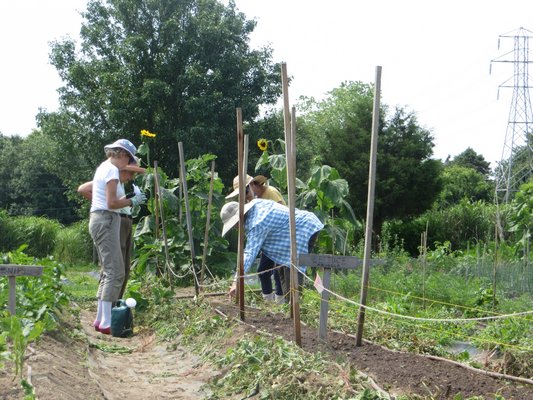
Governed by the laws of nature and dictated by experience, farming is a rule-bound initiative. Yet one group of East End gardeners operate a farm directed by only two principles: consensus and community.
The mindset of Full Circle Farms, which is located in Noyac, is evident on the fields, where members can be seen clustered around a wheelbarrow or next to a water tank, explaining where to plant the cucumbers or debating why the arugula crops look thin.
Membership is open to anyone as long as they commit to working three hours each week from April through November. In exchange for a nominal fee of $150, members can harvest their own fresh vegetables and fruits throughout the season.
“We love vegetables, so everything is a favorite. I even eat those, you know,” said Jackie Reilly as she pointed to a few weeds. A Hampton Bays resident who has been a member for more than 10 years, Ms. Reilly hails from Cambodia and Laos. Familiar with many plants that are considered invasive, she teaches fellow members which ones are edible or can be used medicinally.
Despite the low membership fee, the group, which once boasted more than 30 participants, is now hovering around 15.
“The beach is a much bigger attraction than a farm,” said Gene Friedman, an original member who thinks people don’t have as much time these days for farming, although he hopes to see younger participants soon.
“It takes a certain kind of personality to invest three hours a week and really be into it,” said Hilary Woodward, a longtime member who joined in her late 20s, took a break when her children were young, and then re-joined in her 50s. “I think there is a glorification, a sort of dreaminess, ‘Oh I want to work on a farm.’ she said. "And then you find out it is pretty mundane, hard work.”
Ms. Woodward estimated that the average age of the members is 65, something that the group hopes to change.
“Recently we’ve been saying to younger-member types that we don’t care if you put three hours in a week, you can help us do really big jobs in the fall like cleaning the field,” Ms. Woodward said.
The farm is organic, which means that instead of using synthetic fertilizers, they rely on products like fish emulsion, seaweed or cow manure to boost the soil’s nutrients. However, for some vegetarian members, the use of these products was an issue.
“They really didn’t want us to use anything that had anything to do with animals,” Ms. Woodward said. The group has stopped using fish emulsion, but still uses manure as a fertilizer.
Full Circle Farm began in the early 1980s on Mitchell Lane in Bridgehampton, across the road from Hugh Williams, a well-respected biodynamic farmer and orchardist. Mr. Williams led the group for a few years before leaving to move to upstate New York.
“We were living by our belief system, which was the belief in everybody sharing equally, with equal work and equal results,” Mr. Friedman said when recollecting the farm's first seasons. “That is why we refused to pay anybody to work.”
Shortly after Mr. Williams’s departure, the group needed to find new land, and it divided, both geographically and ideologically. Members who moved to Amagansett began Quail Hill Farms, where, in exchange for higher dues and less work, they hired a full-time farmer. It was one of the first community-supported agriculture farms, or CSAs, in the U.S.
“Of course, right now, [Quail Hill] is a huge organization cultivating a great many acres," Mr. Friedman said. "Whereas, we never really cultivated much more than a half-acre."
The half-acre of land that they operate is that of Leslie Barker, who simply allows it to be used by Full Circle. There is no formal agreement.
Because Full Circle lacks the expertise of a professional farmer, sometimes its yields flag, depending on the levels of commitment and knowledge of the members at the time. However, for some members the farm yields a tremendous learning experience.
“I never would have attempted it without my experience at Full Circle,” said Kathie Keller, a longtime member, of founding the Southampton School District's organic garden with her daughter, Morgana. The farm is open to its members every day of the week, with Monday and Saturdays reserved as communal work times. In the spirit of the collective, member hours are logged through an honor system. Between shifts, they jot down remarks in a notebook and mark planting dates on seed packets for the benefit of fellow members. For bigger decisions, the group relies on potlucks every six weeks or so.
“Sometimes [members] express what they don’t like, and then we kind of decide to try something new or change something,” said Ingrid Krinke, who is in her third year at the farm.
Like any true democracy, sometimes Full Circle seems a little like anarchy. When asked if the communal way of thinking has caused problems, Mr. Friedman said, “Continuously, always and forever.”
“There are always people who have a stronger voice than another,” he said, and added, “They either get their way or they don't.”
As to the future of the farm, Dorothy Friedman, another founding member, said that is uncertain. "It is an organic process that happens,” she said.
We do hope it stays.
"